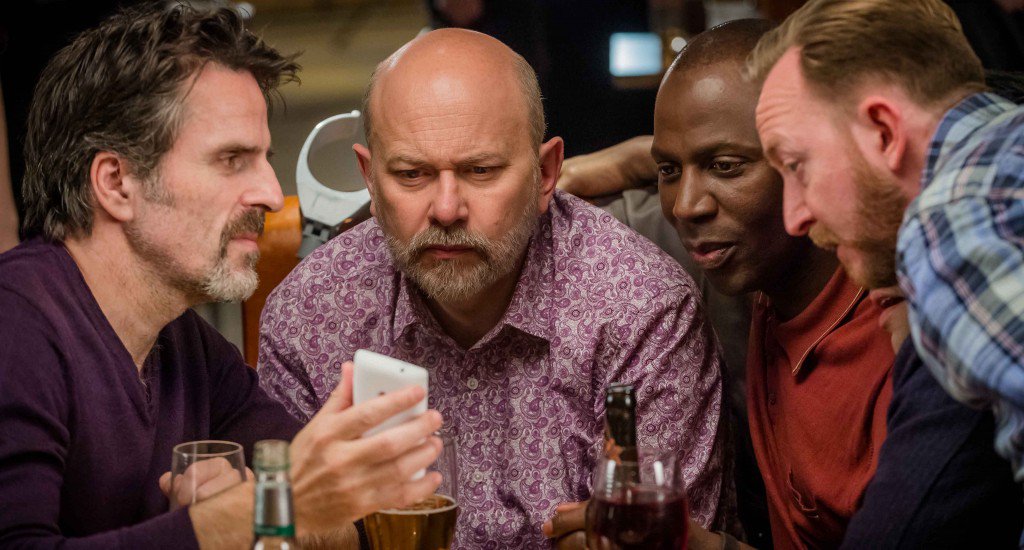OPINION: ‘I thought I’d hate Cucumber but I love it’

 Yesterday, Attitude columnist Iain Dale revealed that, while he had high hopes for Russell T Davies’ twin gay series’ Cucumber and Banana, he’s been left disappointed. Now, Youtuber Calum McSwiggan (pictured) says he had the exact opposite response – expecting to hate the show but falling in love with it:Cucumber
Yesterday, Attitude columnist Iain Dale revealed that, while he had high hopes for Russell T Davies’ twin gay series’ Cucumber and Banana, he’s been left disappointed. Now, Youtuber Calum McSwiggan (pictured) says he had the exact opposite response – expecting to hate the show but falling in love with it:Cucumber
was the word on everyone’s lips on the day that the show started: everyone was looking to Russell T Davies to reveal the show that was assuredly going to be the next big gay thing.
I, however, was completely uninterested. I find shows about gay men for gay men are becoming increasingly tiresome and I was convinced this was going to be more of the same. I first watched with reluctance, expecting stereotypes galore and a show that would overly compensate with rainbows and glitter for what it ultimately lacked in substance, but Cucumber delivered something entirely different, something unique and unexpected, something we haven’t yet seen before.
Iain Dale: ‘I wanted to enjoy Cucumber, really I did’
Banana star Dino Fetscher on tonight’s steamy sex scene
The stereotypes are indeed there with abundance, but the reason Cucumber stands out is its determination to indiscriminately depict all manner of sexual activity and not just linger in the bath houses and rest rooms of yesteryear. We see characters who don’t enjoy penetrative sex, relationships between teachers and students, heterosexual teenagers experimenting, those who enjoy the deep dark realms of BDSM, and those who repress their sexuality entirely. All of these characters are presented without judgement and without label and outside of their sex-filled bubbles they all live normal and unremarkable lives.
It’s an outstanding representation of the secret lives so many of us live but the show has been widely criticised for this very same reason. These depictions are interpreted to be stereotyping all gay men as sex obsessed deviants but I, however, think it’s just the opposite. Cucumber isn’t a show about the normal day-to-day lives of gay men; it’s a show about the extremes and polar opposites of human sexuality and it just so happens to centrally focus on characters who just so happen to be gay.

The characters are all exaggerated versions of people out there in the real world. The majority of us have probably met a Freddie and a Henry in our time, and what Cucumber does is simply bring all these unlikely characters together and lets them (quite literally) bounce off of one another.
It isn’t without its flaws, and yes it plays up to some of the gay stereotypes that we so desperately try to escape, but all in all it delivers a positive message that if nothing else emphasises and celebrates our differences. What’s more, it isn’t exclusively for gay men, it isn’t littered with gay slang and references, and is extremely accessible to those outside of the gay community, bringing important topics into the forefront of the minds of people who wouldn’t otherwise be exposed to them.
In the short space of time the show has been aired, I’ve found myself bombarded with questions from those outside the gay community who want to know and understand more. People empathise and understand the true-to-life issues that some of the characters are facing and that can only be a good thing. The climax of Daniel and Lance’s story was delivered with such heart-breaking precision that social media erupted. People were united in their sympathy for the loss of Lance’s character but there was an evident divide between those who pitied Daniel and those who were furious and baying for his blood. This divide was understandable, repressed sexuality and inner turmoil is a very real issue for thousands of men but how often do we really talk about it?

Cucumber expertly and poignantly addresses its seriousness in a way that is digestible on a Thursday evening. It doesn’t preach, it doesn’t sacrifice entertainment value, it just delivers the stories as they are and leaves us to mull them over. Cucumber has a lot to say and a point to be made, but most importantly it delivers all this in between joyous bouts of humour and whimsy. Couple this with the interlinking storylines of Banana and the intriguing discussions in Tofu and you’ve got yourself a recipe for success.
And if you’re not enjoying Cucumber – if you think its obsession with sex is crass and juvenile – then perhaps it’d be better to opt for a show that isn’t named after a euphemism for a phallus.
